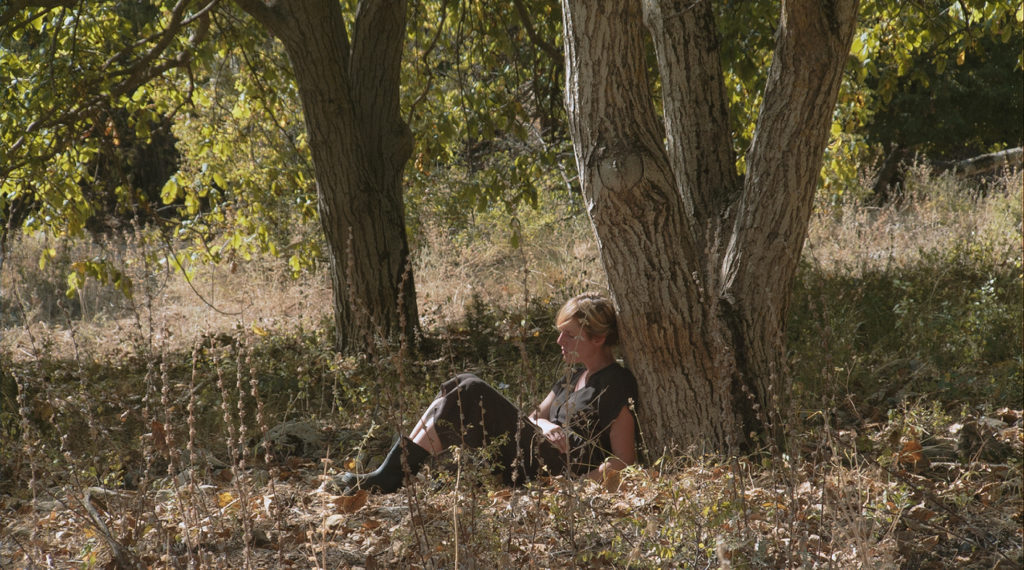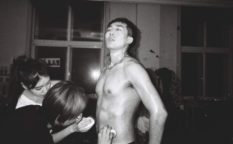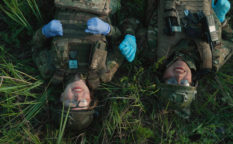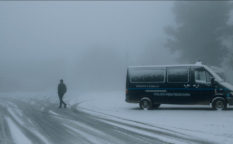Review: Homelands (2020)

Homelands, the second feature-length film by the prolific Serbian editor-turned-director Jelena Maksimović, is quite difficult to pin-point, topic- and label-wise. The best way to describe it is to call it an impressionist docu-fiction work that tackles the topics of one’s search for own roots, history, civil war, evacuation and different homelands, and the life-long, trans-generational women’s struggle against the patriarchy. It premiered at the competition of FID Marseille, before starting the festival tour at DokuFest, in the Balkan competition.
The film opens with a young, unnamed woman, only later credited as Lenka and played by the film’s producer Jelena Angelovski, driving in the car uphill, towards a mountain village, while the famous romantic pop song by the Serbian musician Bajaga plays on her car stereo. The song is about the letting go to the imagination and it sets the mood for the most of the film and Lenka’s mission. The place she goes to is a ski resort in the mountains of the Northern Greece, but, as we find out later on, the same place is the homeland of her grandmother who had to escape from it during the Greek Civil War (1946-1949) because of her and her family’s role in the communist partisan movement.
Homelands is structured in two principal acts, one set during the winter season and the other at the time of a less busy summer, with a couple of archive material interludes along the way. One of them is a piece of a socialist film journal from the war-torn Greece with a partisan song as the soundtrack, and the other one takes a trip to the contemporary Zemun, Serbia, with the graffiti and the busted bust of the former Yugoslav communist president Tito as the sign of the socialist heritage being dismantled.
The first act gets the viewers acquainted to the place, its people (usually the employees of the resort) and its stories, while our protagonist tries to learn snowboarding and visits the abandoned, ruined houses. The survey continues also in the first part of the second act, portraying the slower life centred around the agriculture (fruit-picking, cattle- and sheep-herding) before making a point in the film’s finale, a poetic monologue by Lenka, dealing with the atrocities of the past and the challenges of the present that do not differ very much: capitalism, patriarchy and the exploitation of the natural resources.
Several questions arise from Homelands, how much of it is documentary and how much is the fiction being the central one. Is Lenka a character or a stand in and for whom exactly? What did she learn that she did not know already? By the end of the film, it will all fall into its own place, but the extremely slow pacing and the context-free floating might prove to be too much of a challenge for the less patient viewers.
But Homelands is more about the mood, the message and the impressions, and the main impression is that Maksimović knows what she is trying to achieve, whether if she succeeds in it or not. The technical component of the film is stellar, especially regarding the cinematography of her frequent collaborator and the co-director of her previous documentary Taurunum Boy, Dušan Grubin whose winter- and summertime panorama shots of the semi-abandoned place with a bloody history are quite harrowing. Jakov Munižaba’s sound design highlights the sounds of the nature and contrasts them with the music always played as a part of the ambient.
Maksimović’s choice of the dark, melancholic song by the Slovenian and Yugoslav singer-songwriter Tomaž Pengov for the closing credits sequence is spot-on, especially combined with the context delivered via the textual info-cards. Homelands is a personal and melancholic journey.
Original title: Domovine
Year: 2020
Runtime: 63’
Country: Serbia
Languages: Serbian, English, Greek
Directed by: Jelena Maksimović
Written by: Jelena Maksimović, Olga Dimitrijević
With: Jelena Angelovski, Trifonas Siapalinis, Hristos Tsifas, Polikarpos Parastatidis, Kostas Siapalinis, Marios Siapalinis, Sotirios Goulios, Konstantinos Guolios
Cinematography by: Dušan Grubin
Editing by: Jelena Maksimović
Sound design by: Jakov Munižaba
Colourist: Dušan Grubin
Produced by: Jelena Angelovski
Executive producer: Dejan Stevanović
Associate producers: Ivan Salatić, Dušan Kasalica, Yorgos Tsourgiannis
Production companies: Meander Film, Taurunum Film, ENFM, 3/8
Supported by: Film Centre of Serbia (FCS), Filmske Novosti
Distribution: ENFM
















